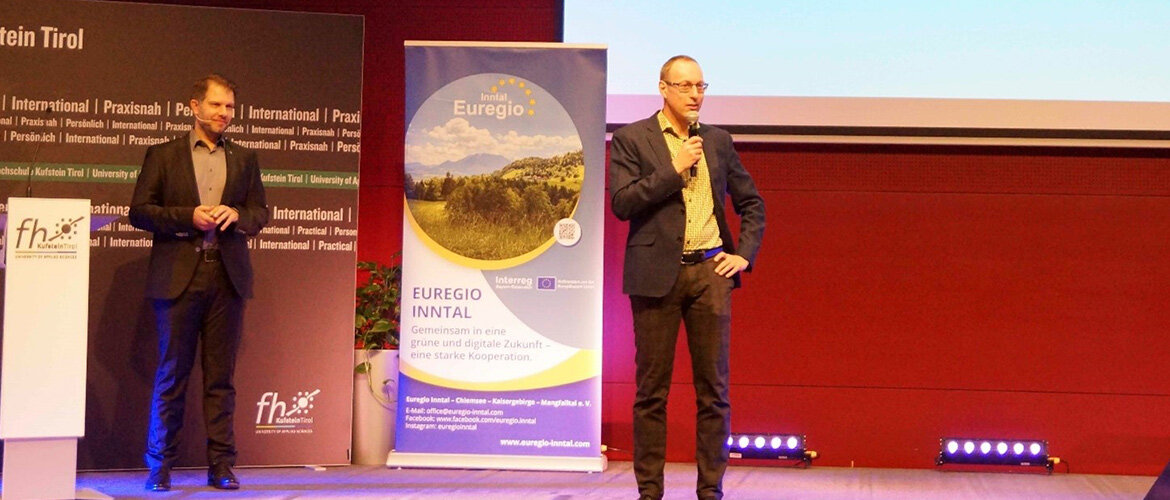Digital and agile transformation network meeting
- 15.12.2023
- Event Review

Prof. (FH) Dr. Mario Döller, Rector of Kufstein University, welcoming the network meeting on digital and agile transformation in SMEs.
The INTERREG Bavaria-Austria-funded network meeting on digital and agile transformation for SMEs took place at the Kufstein University at the end of November. The speakers provided a wide range of insights into concepts and experiences.
Representatives of small and medium-sized enterprises (SMEs) from Bavaria and Tyrol met for a cross-border exchange on agility and digitalization. The network meeting was organized by the bachelor's degree program in Business Management at the University of Applied Sciences Kufstein Tirol in cooperation with the Regional Open Source Innovation Cluster (ROSIK) e.V. and the Kufstein Chamber of Commerce and supported by the EU funding program Interreg Bavaria-Austria.
STARTING POINT OF THE PROJECT IDEA AND INTRODUCTORY REMARKS
Prof. (FH) Dr. Mario Situm, Director of Studies Business Management (now: Leadership & Business Management) at the Kufstein University, presented the project idea and the cooperation with the two partners in his introductory speech. “According to a study published by the University of Applied Sciences in Kufstein in 2019, Austrian SMEs in the manufacturing and retail industries have significant potential in the area of digitalization, but face hurdles such as IT system implementation, a shortage of skilled workers and high investment and operating costs,” said Situm. As part of the study, the companies surveyed emphasized the need for well-founded information about the opportunities on the market in order to be able to make confident decisions.
REORIENTATION AND VERSATILITY NECESSARY
Martina Dickstein, B.A., a management consultant specializing in digitalization, emphasized that SMEs need to reorient themselves in the face of constantly changing environmental factors. “Entrepreneurs should check whether their business model is still viable and how they can position themselves for a successful transformation,” said the digitalization strategist. Dickstein emphasized the importance of holistic digitalization, which should be aligned with the core business. Sylvia Kern, an expert in agile and digital transformation, emphasized that agile corporate management is essential in order to increase flexibility and adaptability. “Employees' future skills play a key role, as do new functions in the organizational structure, such as the TMO control center,” Kern added. Georg Foidl, CEO Managing Director of anewo GmbH, concluded the slot and emphasized the need for a company-specific digital strategy and the involvement of employees in implementation processes for sustainable digitalization.
THE VIEW OF FUNDING BODIES WITH REGARD TO DIGITIZATION
In the first presentation, Walter Nagler, Risk Manager at Sparkasse Kufstein, explained the process of credit risk management at banks and noted that companies are trying to assess their potential risks. “In addition to traditional financial statement analysis metrics, soft facts play a crucial role, including topics such as business model, strategy and ESG (environmental, social and corporate governance), which are strongly influenced by digitalization,” said Nagler. Companies should push ahead with digitalization in order to secure their future financing capability. Dipl.-Kfm. Richard Walsh, digitalization consultant, presented funding opportunities from Bavaria, including process digitalization and digital market development. “Entrepreneurs should deal with these topics and use professional consultants,” recommends Walsh. Peter Wachter, LL.M., District Office Manager of WKO Tirol and Ralf Pauley, Ecommerce Consultant at WKO Tirol, agreed with the previous speaker and explained the situation for Austria. “There are also many funding opportunities here, and the WKO Tirol is happy to advise and support entrepreneurs.”
PANEL DISCUSSION: BEST-PRACTICE EXPERIENCES
In the concluding panel discussion, the experts provided interesting insights from operational practice. A consensus passed among all participants that successful digitalization is largely dependent on the management level. It was emphasized that managers must actively strive for, initiate and continuously accompany the digital transformation. This requires the clear definition of a written digital strategy. Another common point of view was that company processes play a decisive role in the successful implementation of digitalization. The recommendation was to optimize existing, non-digital processes before the digital transition. This is the only way to ensure that the new digital procedures are efficient and lead to increased performance in the company.
